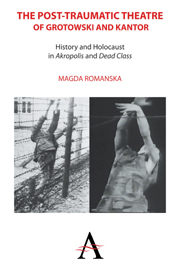 The Post-traumatic Theatre of Grotowski and Kantor
The Post-traumatic Theatre of Grotowski and Kantor from Part I - Our Auschwitz: Grotowski's Akropolis
Although they admired Grotowski's formal theatrical strategies, foreign scholars and critics remained unaware of the relationship between Grotowski and Borowski. In Poland, however, it was common knowledge that both the form and content of Grotowski's Akropolis were inspired by Borowski's writing and the style of his prose. In fact, many have suggested that in his theatrical strategy, Grotowski replicated Borowski's writing style. As Osiński points out, that relationship was completely overlooked, however, in European and American circles. Tadeusz Borowski (1922–1951) was a Polish writer, poet and essayist who survived Auschwitz, wrote a highly acclaimed series of concentration camp stories (published in the USA under the title This Way for the Gas, Ladies and Gentlemen), and committed suicide in 1951 by inhaling gas from an oven. Borowski's 1942 volume of poetry has an “apocalyptic and catastrophist tone [that] stands out against the poetry of his generation, which was shot through with a grand romantic urge to fight.” The poster for Akropolis quotes an epitaph from a poem by Borowski. The poem cited by Grotowski goes like this:
Nad nami – noc. Goreją gwiazdy,
dławiący, trupi nieba fiolet.
Zostanie po nas złom żelazny
i głuchy, drwiący śmiech pokoleń.
Above us – night. Smoldering stars,
stifling, putrid purple of the sky.
We'll leave behind us iron scraps
and hollow sneering laughter [of those – generations – who'll come after us].
To save this book to your Kindle, first ensure [email protected] is added to your Approved Personal Document E-mail List under your Personal Document Settings on the Manage Your Content and Devices page of your Amazon account. Then enter the ‘name’ part of your Kindle email address below. Find out more about saving to your Kindle.
Note you can select to save to either the @free.kindle.com or @kindle.com variations. ‘@free.kindle.com’ emails are free but can only be saved to your device when it is connected to wi-fi. ‘@kindle.com’ emails can be delivered even when you are not connected to wi-fi, but note that service fees apply.
Find out more about the Kindle Personal Document Service.
To save content items to your account, please confirm that you agree to abide by our usage policies. If this is the first time you use this feature, you will be asked to authorise Cambridge Core to connect with your account. Find out more about saving content to Dropbox.
To save content items to your account, please confirm that you agree to abide by our usage policies. If this is the first time you use this feature, you will be asked to authorise Cambridge Core to connect with your account. Find out more about saving content to Google Drive.